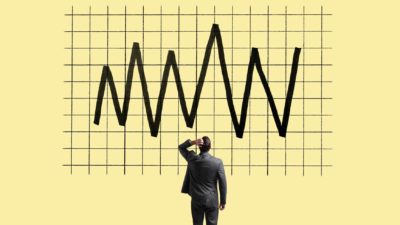Are you ready to be caught with your pants up?
Huh?
Let me explain…
I want to take you inside the tent for a few minutes.
Behind the curtain.
Some of you reading this will be members of Motley Fool services. Others aren't.
But I'm going to share something that's usually reserved for members.
The last 12 months or so have been… tough.
See, the market tends to go through cycles.
Up until COVID-19, it was feeling pretty optimistic. Exuberant, even.
Then, after the fastest bear market in history, in March 2020, we had the fastest recovery in history.
And the exuberance returned.
And then, somewhat ironically, almost in tandem with the announcement of a COVID vaccine, the markets shifted gears.
Gone was the love of high-growth companies and online winners, in favour of some old favourites, mostly banks and mining companies.
Then, as rates began to rise, that loss of love became downright disdain.
Some of the high flyers became, well, fast-fallers.
I've written before about the vertigo-inducing crash of shares in companies like Zip Co Ltd (ASX: ZIP), currently down 92% from its all-time high less than 18 months ago; and Whispir Ltd (ASX: WSP), down 82% since this time two years ago.
Investors abandoned growth companies because of valuations. Or lack of profitability. Or the time they'd take to become really profitable, given rising rates.
All of these reasons are plausible.
Kind of.
The super-profitable search behemoth, Google, is down 25% in less than a year (I own shares, for the record).
Warren Buffett's company, Berkshire Hathaway (ditto), is off 20% in less than six months. To say that it's not known for its tech investments is something of an understatement.
My point?
Well, a few points, actually.
Firstly, some strong, high-quality businesses have lost decent amounts of value recently.
Smaller, less-proven companies have been belted from pillar to post.
Turns out, volatility happens.
(I know… who knew? But more seriously, these are some very significant examples, from all parts of the market and the world.)
Second, every time a share price moves, that movement is one part fundamentals (profits, cash flows, growth, etc) and one part sentiment (how much traders love or hate the company in question, or whole sectors… sometimes even the whole market!).
Those parts, though, aren't always equal.
I've said before that I think Zip's historical high prices were massively overblown. Like a hang-glider on a good day, the share price flew into an almighty updraft of irrational exuberance. Then, as I cleverly and almost imperceptibly change metaphors, like Icarus, it flew too close to the sun and came crashing back to Earth.
Did the company's fundamentals change? Not really. Yes, the external environment (inflation and rates) changed, but that can't explain a $12 share price falling to less than $1.
And those other shares?
Again, perhaps a little bit of fundamental influence, but – I would humbly suggest – probably larger licks of market sentiment. In this case, nervousness, expressed as lower prices.
Now, with hindsight, I can tell you precisely the right times to buy and sell.
I still can't tell you exactly what traders were thinking or when they might change their minds… but we can see the result in share prices.
But because that future is inherently unknowable… it's a mug's game to try to predict it.
Why?
Well, self-evidently because it's not predictable!
But also because we choose to play a different game – one that's been very profitable over the long term.
The example I usually use is Amazon (I own shares) – the company whose shares have fallen more than 50% from their highs about two-dozen times since it was listed on the NASDAQ in 1997 – and, in the meantime, has gone from US$0.09 to US$139.00.
An impressive example, no?
But there are others.
Cochlear fell from $80 to $55 after a product recall. It's now $215.
CBA dropped from $60 to $26 during the GFC. It fell from $90 to $59 during the COVID crash. It's now $97.
Sure, I'd have loved to sell at those highs and buy back at the lows. The problem, as you'll know (or work out if you think it through logically), is that there's no way to know those highs and lows at the time.
And, as I've written before, I recommended our members sell Domino's Pizza Enterprises Ltd (ASX: DMP) (yep, own them, too) in 2013 for a 60% profit.
Which sounds smart… until you realise that was at $13 a share, and they subsequently went to $140. Even at today's price of $65, I gave up on a five-fold return.
And that last one might be the best example.
Yes, I sometimes sell too late (or not at all, but miss the opportunity to sell at higher prices). But that missed five-fold return could have covered 5 different companies that lost 100% each!
Now, I've never had a 100% return. So maybe it could have covered 10 companies that lost 50%. Or 25 companies that lost 20%.
You get the picture.
Yes, selling too late can feel painful. But it's far, far more costly to miss out on the ones that gain 2, 5 or 10 times in value.
But that can take something really important – and difficult for the impatient investor: time.
So, let's put that all together.
And put a bow on it, courtesy of a recent email I received from a member.
He was disappointed that our recommendations have lost value over the past year or so.
My inference is that he wanted us to be able to read the tea leaves, trading in and out of companies and sectors with perfect foresight.
Or (I think it was 'and', actually) he wanted us to take profits more frequently and to limit losses.
They aren't unreasonable requests.
But they're incongruous with the approach we've taken here since 2011 and our sister company in the US has taken since 1993.
We are unashamedly long-term focussed investors. Because we think that's the best way to put the odds meaningfully in our favour.
And we're slow to sell because we realise that such an approach gives us the best chance of letting those 2, 5 and 10-fold returns happen.
Along the way, we'll have losses and disappointments. We collectively (and I personally) hate that, on our members behalf.
We'd love to avoid it.
But in our experience, trying to avoid the losers can also rob you of the chance to bank meaningful winners.
(And if you're wondering, almost every share I own is a Motley Fool recommendation, and my portfolio is also meaningfully down since its highs 12-18 months ago.)
Could we have avoided the falls? Maybe. With a lot of luck. But I don't think so.
I think Berkshire, Google and Amazon will go on to achieve new all-time highs. And more after that. And more after that.
Sure, I could try to buy and sell, hoping to make a few extra bob with lucky timing.
But would I try it and risk losing out on the compound gains that I think will happen as the companies execute on their plans and the market recovers its confidence?
Not a snowflake's chance in hell.
That means I need to be patient.
It means I need to accept volatility.
It means there'll be periods – may be long periods – of underperformance.
But if I can make my peace with that, I think it gives me — and you – the best chance of market-beating returns.
If you're a Motley Fool member, I hope that both informs and reassures you.
If you're not, I hope it gives you some insight into how we invest, but also some ideas on how you might invest your own money.
At the end of the day, democratic capitalism's best days are ahead of it.
Or, more pithily, as Peter Lynch said, "I'm always fully invested. It's a great feeling to be caught with your pants up."
Fool on!









